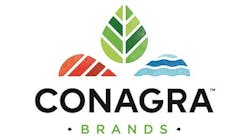The FDA was busy on the GMO front today (Nov. 19), and all in favor of the engineered products. In addition to pronouncing the genetically engineered AquaBounty salmon safe, the agency denied a petition seeking mandatory labeling of genetically modified organisms (GMOs) in food products.
But how about a QR code?
The Center for Food Safety, a national, non-profit public interest and environmental advocacy organization, filed the citizens petition on behalf of 22 other petitioners, including Amy’s Kitchen, Annie’s Homegrown, Consumer Reports, Horizon Organic, Organic Trade Assn. and Stonyfield Farm.
The food safety agency ruled: "The petition does not provide evidence sufficient to show that foods derived from genetically engineered plants, as a class, differ from foods derived from non-GE plant varieties in any meaningful or uniform way, or that as a class, such foods present any different or greater safety concerns than foods developed by traditional plant breeding."
The FDA did admit "while we appreciate consumer interest in the labeling of food derived from genetically engineered plants, consumer interest alone does not provide a sufficient basis to require labeling disclosing whether a food has been produced with or without the use of such genetic engineering. Absent a sufficient basis to require such labeling, the agency cannot compel food manufacturers to label their foods with information regarding whether such foods were produced through the use of genetic engineering."
The organization representing most big food & beverage processors cheered. “The FDA made the right decision for the right reasons, standing with sound science and recognizing that the world’s most respected and authoritative scientific and regulatory bodies have repeatedly found genetically engineered (GE) ingredients to be safe," read a statement from the Grocery Manufacturers Assn.
But GMA also "look(s) forward to continuing to work with Congress to enact a uniform national standard for food labeling that would prevent a costly and confusing patchwork of state labeling mandates. Our industry is committed to transparency and to addressing the increasing desire by shoppers for more information about the products they buy, use and consume.”
While national GMO labeling legislation has been bogged down in Congress, reports say some legislators see QR codes as a compromise solution. They wouldn't flag a food product as GMO, but interested consumers could find out if the product was genetically engineered. National legislation would pre-empt GMO food labeling laws in Vermont, Connecticut, and Maine.
Critics say QR codes are too passive and that a small portion of the population (estimated at less than 20 percent) has ever used a QR code.

